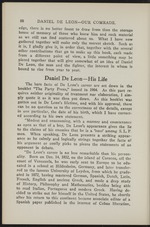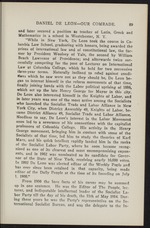| 1 |
 |
“...ance as he calmly and logically strings together the facts of
his argument or coolly picks to pieces the statements of an
opponent in debate.
De Leons career is no less remarkable than his person-
ality. Born on Dec. 14, 1852, on the island of Curacoa, off the
coast of Venezuela, he was early sent to Europe to be edu-
cated in a school at Hildesheim, Germany, and later transfer-
red to the famous University of Leyden, from which he gradu-
ated in 1872, having mastered German, Spanish, Dutch, Latin,
French, English and ancient Greek, and made a deep study
of History, Philosophy and Mathematics, besides being able
to read Italian, Portuguese and modern Greek. Having de-
cided to strike out for himself in the United States, he shortly
after his return to this continent became associate editor of a
Spanish paper published in the interest of Cuban liberation....”
|
|
| 2 |
 |
“...DANIEL DE LEONOUR COMRADE. 89
and later secured a position as teacher of Latin, Greek and
Mathematics in a school in Westchester, N. Y.
While in New York, De Leon took the course in Co-
lumbia Law School, graduating with honors, being awarded the
prizes of international law and of constitutional law, the for-
mer by President Woolsey of Yale, the second by William
Beach Lawrence of Providence; and afterwards twice suc-
cessfully competing for the post of Lecturer on International
Law at Columbia College, which he held for two successive
three-year terms. Naturally inclined to reibel against condi-
Hons which he saw were not as they should be, De Leon be-
gan to interest himself in the reform movements of that time,
finally joining hands with the Labor political uprising of 1885,
which set up the late Henry George for Mayor in this city,
De Leon also interested himself in the Knights of Labor, and
m later years was one of the most active among the Socialist
who lynched the Socialist Trade...”
|
|
